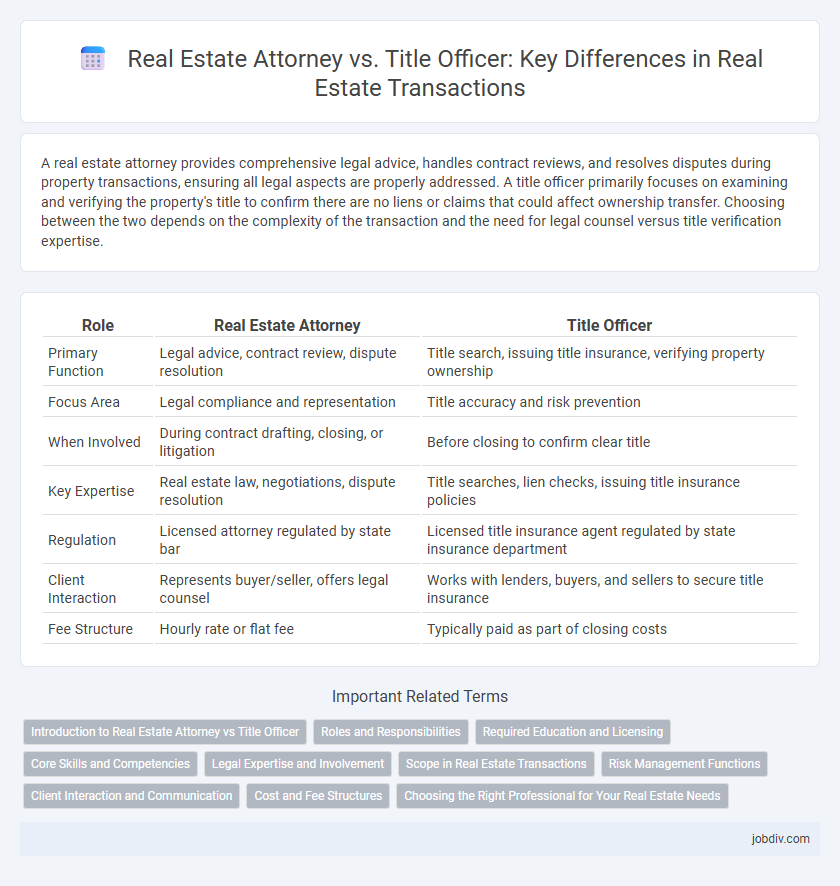A real estate attorney provides comprehensive legal advice, handles contract reviews, and resolves disputes during property transactions, ensuring all legal aspects are properly addressed. A title officer primarily focuses on examining and verifying the property's title to confirm there are no liens or claims that could affect ownership transfer. Choosing between the two depends on the complexity of the transaction and the need for legal counsel versus title verification expertise.
Table of Comparison
| Role | Real Estate Attorney | Title Officer |
|---|---|---|
| Primary Function | Legal advice, contract review, dispute resolution | Title search, issuing title insurance, verifying property ownership |
| Focus Area | Legal compliance and representation | Title accuracy and risk prevention |
| When Involved | During contract drafting, closing, or litigation | Before closing to confirm clear title |
| Key Expertise | Real estate law, negotiations, dispute resolution | Title searches, lien checks, issuing title insurance policies |
| Regulation | Licensed attorney regulated by state bar | Licensed title insurance agent regulated by state insurance department |
| Client Interaction | Represents buyer/seller, offers legal counsel | Works with lenders, buyers, and sellers to secure title insurance |
| Fee Structure | Hourly rate or flat fee | Typically paid as part of closing costs |
Introduction to Real Estate Attorney vs Title Officer
A Real Estate Attorney specializes in legal matters related to property transactions, ensuring contracts are sound and disputes are resolved efficiently. A Title Officer focuses on verifying and insuring property titles, guarding against title defects and ensuring clear ownership transfer. Both roles are critical in real estate transactions but serve distinct functions within the property closing process.
Roles and Responsibilities
Real estate attorneys handle legal aspects of property transactions, including contract review, dispute resolution, and ensuring compliance with state laws. Title officers focus on verifying the property's title, conducting title searches, and issuing title insurance to protect against potential ownership claims. Both roles are crucial in safeguarding the interests of buyers and sellers throughout the closing process.
Required Education and Licensing
Real estate attorneys typically require a Juris Doctor (JD) degree and must pass the state bar exam to practice law, ensuring legal expertise in property transactions and dispute resolution. Title officers usually hold a high school diploma or associate degree, with licensing requirements varying by state, often involving certification through title insurance underwriters. The distinction in education and licensing underscores the attorney's legal authority versus the title officer's specialized role in title verification and insurance processing.
Core Skills and Competencies
A Real Estate Attorney specializes in legal contract drafting, dispute resolution, and compliance with property laws, ensuring transaction legality and safeguarding client interests. A Title Officer demonstrates expertise in title search, examination, and insurance issuance, verifying property ownership and identifying potential liens or encumbrances. Both roles demand strong attention to detail, knowledge of real estate regulations, and effective communication skills to facilitate smooth property transactions.
Legal Expertise and Involvement
Real estate attorneys possess comprehensive legal expertise to handle complex property transactions, disputes, and contract negotiations, ensuring clients' rights are protected throughout the process. Title officers specialize in examining property titles, resolving title issues, and facilitating title insurance to guarantee clear ownership transfer but typically lack the broader legal authority to represent clients in court. The attorney's involvement often extends to drafting legal documents and providing litigation support, while title officers focus primarily on title verification and risk management.
Scope in Real Estate Transactions
A real estate attorney handles comprehensive legal matters including contract review, dispute resolution, and ensuring compliance with local laws during property transactions. A title officer primarily focuses on verifying the property's title, conducting title searches, and issuing title insurance to protect against ownership disputes. Their scope overlaps in title examination, but attorneys provide wider legal counsel throughout the entire real estate process.
Risk Management Functions
Real estate attorneys specialize in risk management by reviewing contracts, identifying legal issues, and resolving disputes to protect client interests throughout property transactions. Title officers focus on verifying property titles, conducting thorough title searches, and issuing title insurance to prevent ownership risks and ensure clear property transfer. Effective risk management in real estate requires collaboration between attorneys and title officers to mitigate legal liabilities and safeguard the transaction process.
Client Interaction and Communication
Real estate attorneys provide personalized client interaction by offering detailed legal advice and addressing complex transaction issues directly with buyers or sellers. Title officers primarily communicate through documentation, verifying title status and resolving title defects with lenders and title companies rather than clients. Effective communication from an attorney ensures clients fully understand legal implications, while title officers facilitate smooth property transfers by managing title insurance and records.
Cost and Fee Structures
Real estate attorneys typically charge hourly rates ranging from $150 to $400, with additional fees for document review and legal consultations, making their services more costly but comprehensive. Title officers often work on a fixed fee or a percentage of the property's sale price, generally lower than attorney fees, covering title searches and insurance issuance. Understanding these cost structures helps buyers and sellers balance legal protection with budget considerations during property transactions.
Choosing the Right Professional for Your Real Estate Needs
A real estate attorney specializes in legal aspects of property transactions, offering contract review, dispute resolution, and detailed legal advice tailored to complex property issues. A title officer ensures the accuracy of property titles, conducting thorough title searches and facilitating insurance to protect against ownership disputes. Selecting the right professional depends on your specific needs: choose a real estate attorney for legal complexities and a title officer for title verification and insurance protection.
Real Estate Attorney vs Title Officer Infographic

 jobdiv.com
jobdiv.com